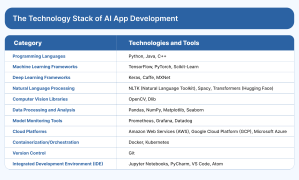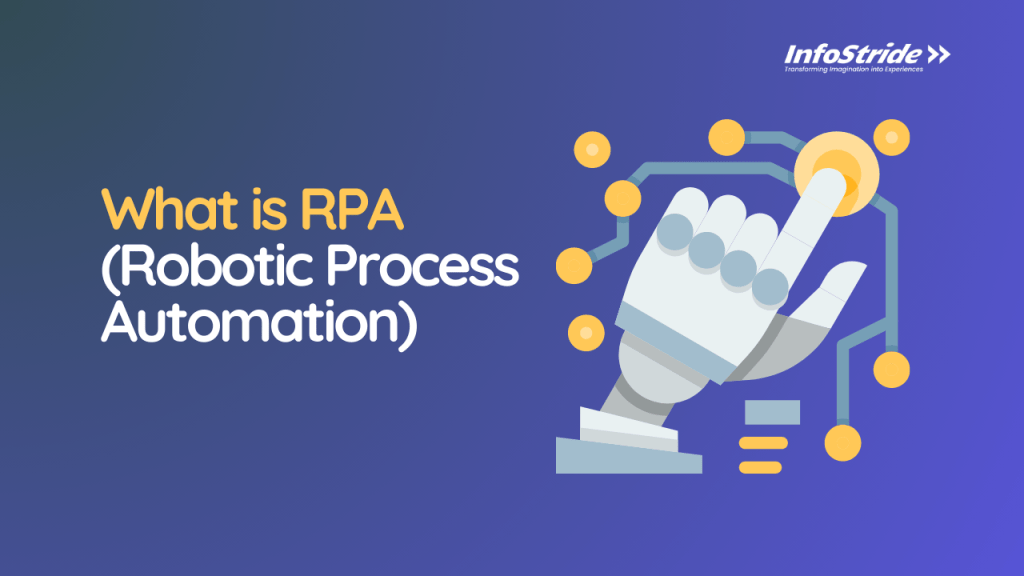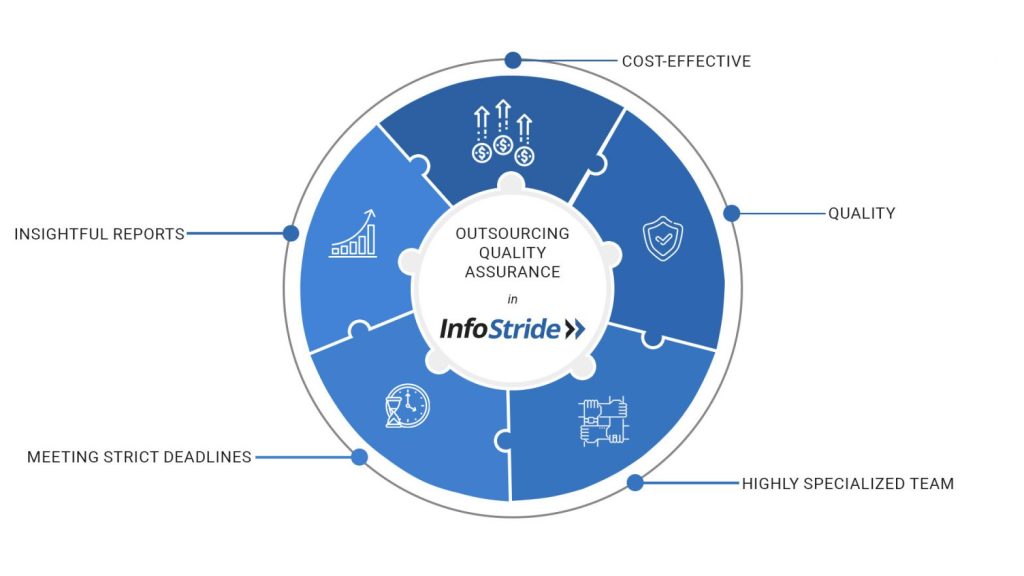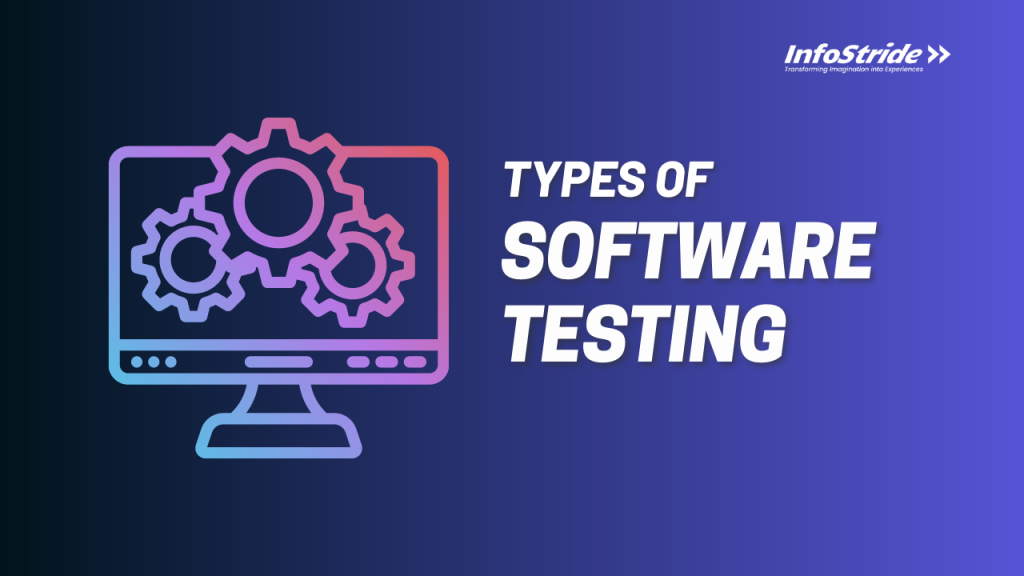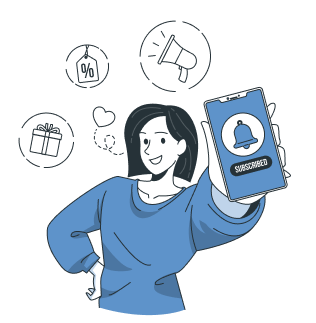From healthcare to automobiles, artificial intelligence (AI) is rapidly disrupting various industries, transforming processes, enhancing operational efficiency and unlocking new opportunities. From 2015 to 2019, there was a whopping 270% increase in the adoption of AI services by businesses, according to Gartner.
More organizations are harnessing the potential of AI to improve decision making, elevate customer experiences, build new revenue streams and gain a competitive edge. But how do you build an AI app?
In this comprehensive step-by-step AI app development guide, we’ll walk you through the process of building an AI app from scratch.
Top 7 Use Cases of AI in Mobile App Development
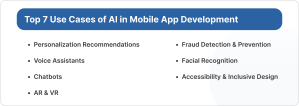
Before you learn how to build an AI app, let’s first have a look at some of the popular use cases of AI mobile app development with real-life examples:
1. Personalization Recommendations
AI-powered intelligent recommendation engines are revolutionizing mobile apps by analyzing user behavior, preferences and historical data to offer personalized content recommendations. For example, Netflix uses AI algorithms to recommend TV shows and movies based on a user’s viewing history and preferences, while Spotify uses AI to suggest personalized playlists based on a user’s preferences and listening history.
2. Voice Assistants
AI-powered voice assistants like Google Assistant, Siri and Amazon’s Alexa offer hands-free interaction with smartphones. These intelligent assistants allow users to control their devices, execute tasks and access information through natural language commands.
3. Chatbots
AI-powered chatbots are taking customer service to the next level by facilitating 24/7 support, answering FAQs, and addressing user queries in a conversational manner. Today, many e-commerce platforms use chatbots to help users with product inquiries, order tracking and issue resolution.
4. Augmented Reality (AR) and Virtual Reality (VR)
AI is empowering AR and VR apps to deliver immersive experiences that perfectly blend the digital and physical worlds. For example, a popular AI-driven AR app IKEA Place empowers people to virtually place furniture in their homes to visualize interior design options before making a significant investment.
5. Fraud Detection & Prevention
AI algorithms help safeguard mobile app transactions and protect user data. AI-powered fraud detection systems can detect suspicious patterns, identify anomalies, and prevent unauthorized access to financial information. For example, PayPal’s fraud detection system uses AI to analyze transaction data and detect potential fraud in real-time.
6. Facial Recognition
AI is extensively used to create facial recognition systems that can identify the individual based on their facial features. For example, in smartphones, AI-powered facial recognition offers a convenient and secure method for user authentication, letting individuals unlock their devices seamlessly.
7. Accessibility & Inclusive Design
AI is enabling mobile apps to become more accessible and inclusive for users with disabilities. AI algorithms can provide features such as voice control, text-to-speech and gesture recognition, making mobile apps more usable for all including people with visual or physical impairments.
These real-life examples clearly demonstrate the transformative impact of AI in mobile app development, elevating user experiences, improving app functionality, promoting accessibility and driving innovation across various industries. As AI technology continues to evolve, its integration into mobile applications will only intensify, shaping the future of app development.
How to Build an AI App?

The AI app development follows a structured process, comprising several pivotal steps, with each step playing a crucial role in determining the overall success of your application. Without adding further, let’s learn how to build an AI app from the ground up.
Step 1: Define the Problem
The first step in the AI mobile app development process is to identify the problem you would like to address with your AI app. Why is this step crucial? Below are some of the reasons:
- To set goals and metrics: defining the problem enables you to establish clear goals and metrics for your AI app. This provides a benchmark for evaluating your app’s success and determining whether it is truly addressing the problem you set out to solve.
- To guide data collection and preparation process: It helps you identify the types of data needed to train and evaluate the AI model, ensuring that you collect relevant and high-quality data.
- To choose the right algorithm: different AI algorithms are suited for different types of problems and understanding the problem will help you choose the algorithm that is most likely to produce effective results.
- To build user-centric design: defining the problem from the perspective of the user ensures that your AI app is designed to address their needs and solve their pain points.
Step 2: Collect and Prepare Data
Once you have defined the problem you want to solve with AI, you need to collect your data from potential sources such as existing databases, data scraped from the internet, public datasets, external APIs, sensors, surveys or interviews. As most of the data you’ll gather will be unstructured. Thus, it requires significant data cleaning and preparation before you can utilize it to train your AI model.
Step 3: Choose an AI Algorithm
AI algorithms are the core of artificial intelligence, empowering machines to learn from data, make decisions and resolve problems. There are many different types of AI algorithms available. The choice of algorithm will depend on the specific problem you want to solve and the type and size of data you have.
Below are some of the most common AI algorithms used in mobile applications:
- Machine learning (ML): ML algorithms are well-suited for tasks such as image recognition, predictive analytics and natural language processing.
- Deep learning: It is a type of machine learning that utilizes artificial neural networks to learn from data. Deep learning algorithms are best suited for tasks such as speech recognition, image recognition, facial recognition and natural language processing.
- Natural language processing (NLP): NLP algorithms comprehend and process human language. They are ideal for tasks such as chatbots, virtual assistants and text summarization.
- Computer vision: Computer vision algorithms comprehend and interpret images and videos. Thus, they are ideal for tasks such as facial recognition, object detection and AR/VR.
- Reinforcement learning: Reinforcement learning algorithms learn from trial and error. This means that these algorithms interact with its environment and receive rewards or penalties based on its actions. Notably successful in mastering complicated games like chess, these algorithms have revolutionized the realm of game playing.
- Supervised learning: Supervised learning algorithms learn from labeled data. This implies that the data is labeled with the correct answer, so the algorithm can learn to predict the correct answer for new data. Thus, supervised learning algorithms are best suited for tasks like email spam filtering, medical diagnosis and fraud detection.
- Unsupervised learning: Unsupervised learning algorithms learn from unlabeled data. This implies that the data is not labeled with the correct answer, so the algorithm must find patterns in the data on its own. Thus, unsupervised learning algorithms are best suited for tasks like customer segmentation and personalized recommendations.
Step 4: Train the AI Model
The next step is to train your AI model. This means feeding the algorithm your data and adjusting the model’s parameters until it learns to make accurate predictions on the training data.The amount of data you need to train your model will depend on the complexity of the problem you are trying to address.
Step 5: Model Integration & App Development
The AI model is integrated into the mobile or web application framework. This involves creating APIs, connecting the model to the app’s user interface, and ensuring seamless integration with other functionalities. The app’s design should be intuitive and user-friendly, allowing users to interact with the AI model effectively.
With MVP development services to design and build your app, you can test your idea with real potential users and validate market demand before investing substantial resources and time into developing a full-fledged product that may not resonate with the target audience.
Step 6: Test and Deploy the AI App
Rigorous quality assurance testing is essential to ensure your AI app’s functionality, performance, and security. Once testing is complete, the app is deployed to the production environment, making it accessible to users.
Step 7: Post-Deployment Maintenance
Continuously monitoring the AI app is important to ensure it is performed as expected. Thus, implement monitoring tools to track the AI app’s performance and identify potential issues. Regular updates, which include security patches and version changes, is also essential for optimal performance.
The Technology Stack of AI App Development
The technology stack for AI app development involves a combination of programming languages, frameworks, libraries, and tools that facilitate the creation, training, and deployment of artificial intelligence models. Here’s a typical technology stack to build an AI app from scratch:
How can InfoStride help you build a successful AI app?
As an AI app development company, we have a comprehensive understanding of user experience design and ethical considerations to build a successful AI mobile application.
We have a dedicated team of experienced AI and machine learning experts who can help you navigate the entire AI mobile app development process. Our AI development services cover everything from choosing the right AI algorithms to preparing the data, training AI models, and deployment.
What makes us stand out is to incorporate ethical considerations and responsible AI practices throughout the development process.
Contact us if you have a breakthrough app idea that can be solved through AI.
FAQs
1. How much does it cost to build an AI app?
The cost of AI app development can vary significantly depending on several factors, which include but are not limited to the complexity of the app, data requirements, the choice of AI model, the tech stack used and the expertise of the development team. So, it’s best to reach out to an AI mobile app development company with your vision to get an estimate.
2. How long does it take to build an AI app?
The time it takes to build an AI app can also vary depending on factors, such as the complexity level of the application, the experience of the development team, the availability of tech resources and the scope of your AI app development project. On average, building an AI app from ground up can take anywhere from a few months to several years.
3. What are some common challenges in AI app development?
Some of the common challenges in AI app development include:
- Data collection & preparation: Collecting and preparing high-quality data is crucial for training AI models. However, this can be a cumbersome and expensive process.
- AI Model selection: With many different AI models available out there, choosing the right one for your problem can be a challenge.
- Integration & deployment: Integrating AI models into mobile applications and deploying them to production can be a complex process.
- Continuous learning & adaptation: AI models need to adapt to evolving user requirements. Thus, it’s crucial to implement mechanisms for continuous learning, keep pace with advancements in AI and regularly update AI models with new data. This can be a challenge.
- Ethical considerations: The responsible use of AI technology in applications and its potential impact on society must be carefully addressed.
4. How to choose an AI app development company?
Below are some key factors to consider for choosing the right AI app development company for your needs.
- Look for an AI mobile app development company with a strong proven track record of building successful AI apps. Consider their experience in your specific niche or industry.
- Evaluate the company’s technical expertise in AI technologies, such as machine learning, deep learning, and natural language processing. Make sure they have the required skills to handle the complexity level of your project.
- Get clear estimates of your AI app development project costs and pricing structure. Compare pricing models from different AI mobile app development companies.
- Check for testimonials and reviews from past clients to gain insights into the company’s performance and customer satisfaction.
- Review the company’s portfolio of past projects to understand the type of work they have done and the challenges they have addressed.


